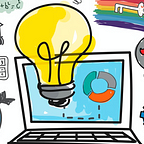The Neuroscience Of Branding
How Apple And Nike Have Branded Your Brain
Coke is just soda, Tylenol is just acetaminophen and Levi’s are just jeans. Yet consumers go out of their way to select these specific brand over the others.
An economist will say ‘How is this possible?’ that a rational consumer would be willing to pay more for exactly the same thing.
We like to think about ourselves as rational. That’s not how it works. A very famous study done by colleagues at Duke university flashed wither the Apple logo or the IBM logo to the randomized group of participants. The studies found that a after being subliminally exposed to the Apple logo compared to when you’ve been exposed to the IBM logo, participants performed better on creative tasks.
And the argument is that Apple has been telling you this story over and over again that Apple is the brand for hip, cool, fun, creative people.
This is the true power of brands they can influence our behaviors in ways that extend way beyond the point of sale. So to what degree can the influence of brands wreak havoc on our ability to make rational spending decisions?
When I make choices about different brands I’m choosing to create an identity. When I put that shirt on, when I put those shoes on, those jeans, those hats someone is gonna form an impression about what I’m about.
So if I’m choosing Nike over Under Armour, I’m choosing a kind of fifteenth way to express affliation with sports. The Nike thing is about performance and the Under Armour thing is about the underdog. I have to choose which of these different conceptual pathways is most consistent with where I am in my life.
And once a consumer ales the choice, their relationship with the brand can deepen to the point where they identity with the brand Ike family. And once you identifying with the brand, it can shape the way you behave.
And it’s really interesting that if also someone talks bad about their product, brand or service they will be the first to go out and defend because an attack on the brand is an attack on themselves.
There is an idea in marketing, which is that, we relate to brands the same way we relate to people. It’s like ‘I love this brand’ or ‘I hate this brand’. Of course what people say can often be different from what’s really going on their heads.
So research was conducted where the brains of Apple and Samsung users using an MRI machine where they heard good, bad and neutral news about Apple and Samsung.
Apple customer shows a brain empathy response toward Apple that was exactly what you’d see in the way you would respond to somebody in your family. Strangely Samsung users did not have any positive ot negative responses when good or bad news was released about their brand. The only empathy that Samsung users showed was reverse empathy for Apple news, meaning if the Apple headline was negative, their brain reflected a positive response.
You know it really shows us that Apple has clearly defined the market here. Samsung customers it seems from their brain data, are only buying Samsung because they hate apple and not because they love Samsung.
Most people just don’t realize that they are subconsciously choosing brands because those brands have some kinds of expressive value.
You can see there’s a lot of power here in terms of shaping consumer decisions.
So as consumers, what can we do to make informed choices. Well the best thing that we could do is to be aware of the influence that brands hold.
I think it’s important to always pause and think a little bit about ‘okay, why am I buying this product?’. And like it or not brands are not going anywhere. I’ve heard lots of people push back and say that ‘I’m not into brands’ which in itself is a self branding of choosing Anti-brand brand.
What is that I’ve learnt about identity over time? I think a lot of it has to with the fundamental needs that we as humans have to have support systems.
Perhaps, it was the church, the community, or was these other institutions that existed. Now brands have stepped in as pillars of our identity. So I’m very much motivated to see that in that positive light.
